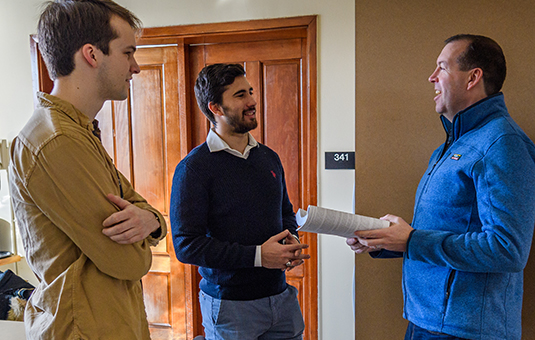Computer Science
Our faculty are connected to the latest trends in computing practices and research. Research interests range from classical and quantum computing to human-computer interaction to assistive technology to artificial intelligence and speech recognition, and so much more.
Submissions from 2017
Voting in the presence of byzantine faults, Lewis Tseng
Camera mouse: Dwell vs. computer vision-based intentional click activation, Rafael Zuniga and John Magee
Submissions from 2016
Comparison of two methods to control the mouse using a keypad, Torsten Felzer, Ian Scott Mackenzie, and John Magee
Eye-gaze with predictive link following improves accessibility as a mouse pointing interface, Vazquez Li Jason, Lyle Pierson Stachecki, and John Magee
Dilation of Chisini-Jensen-Shannon divergence, Piyush Kumar Sharma and Gary Holness
A family of Chisini mean based Jensen-Shannon divergence kernels, Piyush Kumar Sharma, Gary Holness, Yuri Markushin, and Noureddine Melikechi
Recent results on fault-tolerant consensus in message-passing networks, Lewis Tseng
Submissions from 2015
Virtual fingerprint - image-based authentication increases privacy for users of mouse-replacement interfaces, Viktoria Grindle, Syed Kamran Haider, John Magee, and Marten van Dijk
Academic Aide - Free online math question database for academic improvement, Jian Bin Guo, Lukas Leung, and John Magee
Camera Mouse + Clicker AID: Dwell vs. Single-muscle click actuation in mouse-replacement interfaces, John Magee, Torsten Felzer, and I. Scott Mackenzie
Predictive link following for accessible web browsing, Jiri Roznovjak and John Magee
Investigating manifold neighborhood size for nonlinear analysis of LIBS amino acid spectra, Piyush Kumar Sharma, Gary Holness, Poopalasingam Sivakumar, Yuri Markushin, and Noureddine Melikechi
Broadcast using certified propagation algorithm in presence of Byzantine faults, Lewis Tseng, Nitin Vaidya, and Vartika Bhandari
Fault-tolerant consensus in directed graphs, Lewis Tseng and Nitin H. Vaidya
Control yourself: A mixed-reality natural user interface, Elena Zhizhimontova and John Magee
Submissions from 2014
Euclidean sections of protein conformation space and their implications in dimensionality reduction, Mojie Duan, Minghai Li, Li Han, and Shuanghong Huo
Adaptive sliding menubars make existing software more accessible to people with severe motion impairments, Christopher W. Kwan, Isaac Paquette, John J. Magee, and Margrit Betke
Iterative approximate consensus in the presence of Byzantine link failures, Lewis Tseng and Nitin Vaidya
Synchronous convex hull consensus in the presence of crash faults, Lewis Tseng and Nitin H. Vaidya
Submissions from 2013
Evaluation of dimensionality-reduction methods from peptide folding-unfolding simulations, Mojie Duan, Jue Fan, Minghai Li, Li Han, and Shuanghong Huo
Configurations and path planning of convex planar polygonal loops, Li Han, Lee Rudolph, Michael Chou, Sean Corbett, Emily Eagle, Dylan Glotzer, Jake Kramer, Jonathan Moran, Christopher Pietras, Ammar Tareen, and Matthew Valko
Graph representation of protein free energy landscape, Minghai Li, Mojie Duan, Jue Fan, Li Han, and Shuanghong Huo
Automatically generating online social network messages to combat social isolation of people with disabilities, John J. Magee and Margrit Betke
Integrating a science perspective into an introductory computer science course, John J. Magee and Li Han
Iterative approximate byzantine consensus under a generalized fault model, Lewis Tseng and Nitin Vaidya



